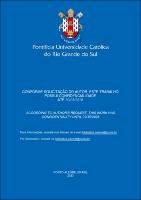| Share record |


|
Please use this identifier to cite or link to this item:
https://tede2.pucrs.br/tede2/handle/tede/10687| Document type: | Tese |
| Title: | O direito fundamental à motivação das decisões judiciais e a exigência de eficiência nas dimensões interpretativa, endoprocessual e gerencial |
| Author: | Dall'Alba, Felipe Camilo  |
| Advisor: | Reichelt, Luis Alberto |
| Abstract (native): | A motivação da sentença, para cumprir sua função constitucional, deve ser interpretada à luz da eficiência. O método utilizado na presente investigação foi o hipotético-dedutivo, e os tipos de pesquisa foram de caráter qualitativo, bibliográfico e jurisprudencial. No trabalho, parte-se da fase histórica do instituto. Percebe-se a presença da motivação na grande parte dos sistemas jurídicos dos países da Idade Média, a exemplo dos direitos italiano, português, francês, e sua consolidação se deu na revolução francesa. Aliás, a ligação de Portugal e Brasil com o tema sempre foi próxima, pois ela estava prevista nas Ordenações. Atualmente, o princípio da motivação está contido tanto na Constituição como no Código de Processo Civil. Ela deve ser estruturada de forma que a argumentação seja a mais racional possível. Por sua vez, na busca pela eficiência da motivação, é importante conhecer o direito de outras nações. Isso porque a experiência estrangeira aponta, no direito dos países examinados (Itália, França, Portugal e Inglaterra), a preocupação com a clareza e a concisão dos provimentos decisórios. Por seu turno, a eficiência, para cumprir sua tarefa, tem que ser examinada sob o viés interpretativo, gerencial e endoprocessual, pois são faces da mesma medalha. Por fim, o diálogo profícuo entre eficiência, motivação e o direito de defesa, o direito à publicidade, o direito à duração razoável do processo, o direito à segurança jurídica e o direito a um juiz imparcial, permite que a motivação seja clara, concisa e que o juiz não necessite examinar toda e qualquer alegação das partes. |
| Abstract (english): | In order to fulfill its constitutional purpose, the reasoning of the sentence must be interpreted according to efficiency. The method used in the present investigation was hypothetical-deductive, and the types of research were qualitative, bibliographical and case law. The present work begins with the history of the legal reasoning. Its presence is perceived in most of legal systems of the Middle Ages, such as Italian, Portuguese, and French, and its consolidation occurred in the French Revolution. The connection between Portugal and Brazil in the topic is proximate, as it was provided in the Ordinations. Nowadays, o principle of legal reasoning is present in the Constitution and in the Civil Procedure Code. It must be structured in such a way that reasoning/justification is as most rational as possible. In the pursuit of the efficiency of reasoning, it is relevant to know the law of other nations, because the foreign experience points in the direction that, in those countries (Italy, France, Portugal, and England), clarity and concision of legal decisions matter. Efficiency, to fulfill its task, must be analyzed considering interpretational, managerial and endoprocedural views, as they are sides of the same coin. To conclude, the constant dialogue between efficiency and reasoning and the rights to legal counsel, publicity, reasonable time of proceedings, legal certainty and to an impartial judge allows that reasoning must be clear and concise and that judges do not need to analyze every single argument made by the parts. |
| Keywords: | Motivação Eficiência Direitos Fundamentais Clareza Concisão Reasoning Efficiency Fundamental Rights Clarity Concision |
| CNPQ Knowledge Areas: | CIENCIAS SOCIAIS APLICADAS::DIREITO |
| Language: | por |
| Country: | Brasil |
| Publisher: | Pontifícia Universidade Católica do Rio Grande do Sul |
| Institution Acronym: | PUCRS |
| Department: | Escola de Direito |
| Program: | Programa de Pós-Graduação em Direito |
| Access type: | Acesso Aberto |
| Fulltext access restriction: | Trabalho será publicado como artigo ou livro |
| Time to release fulltext: | 60 meses |
| Date to release fulltext: | 30/03/2028 |
| URI: | https://tede2.pucrs.br/tede2/handle/tede/10687 |
| Issue Date: | 21-Dec-2022 |
| Appears in Collections: | Programa de Pós-Graduação em Direito |
Files in This Item:
| File | Description | Size | Format | |
|---|---|---|---|---|
| TES_FELIPE_CAMILO_DALLALBA_CONFIDENCIAL.pdf | FELIPE-CAMILO_DALLALBA_TES | 376.19 kB | Adobe PDF |  Download/Open Preview |
Items in DSpace are protected by copyright, with all rights reserved, unless otherwise indicated.




